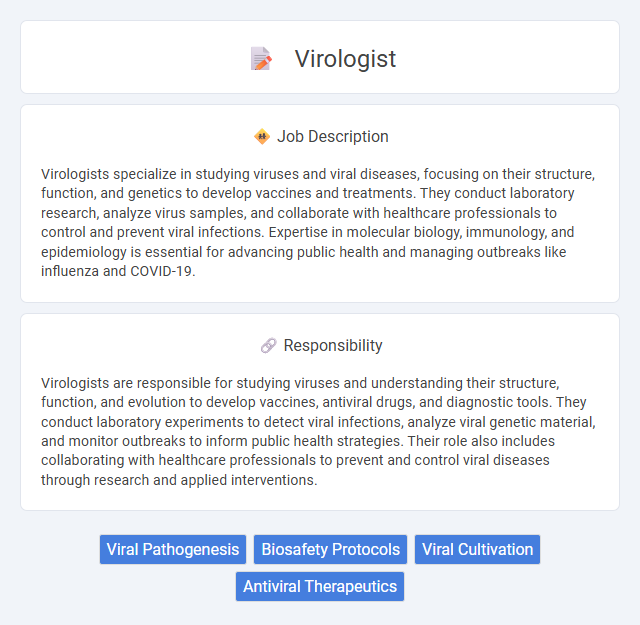
Virologists specialize in studying viruses and viral diseases, focusing on their structure, function, and genetics to develop vaccines and treatments. They conduct laboratory research, analyze virus samples, and collaborate with healthcare professionals to control and prevent viral infections. Expertise in molecular biology, immunology, and epidemiology is essential for advancing public health and managing outbreaks like influenza and COVID-19.
People with a strong interest in biology and laboratory work are likely to be suitable for a career as a virologist. Those who enjoy detailed research, problem-solving, and working in controlled environments might find this job fulfilling. Individuals who prefer dynamic social interactions or less technical tasks may find the role less compatible with their strengths.
Qualification
Virologists typically hold advanced degrees such as a Ph.D. or a master's degree in virology, microbiology, or a related field, with extensive laboratory experience in virus identification and research techniques. Essential qualifications include proficiency in molecular biology methods, bioinformatics, and handling biosafety protocols, alongside strong analytical and problem-solving skills. Certifications like CLS (Clinical Laboratory Scientist) or specialized virology training further enhance expertise and employment prospects in clinical, research, or pharmaceutical settings.
Responsibility
Virologists are responsible for studying viruses and understanding their structure, function, and evolution to develop vaccines, antiviral drugs, and diagnostic tools. They conduct laboratory experiments to detect viral infections, analyze viral genetic material, and monitor outbreaks to inform public health strategies. Their role also includes collaborating with healthcare professionals to prevent and control viral diseases through research and applied interventions.
Benefit
A career as a virologist likely offers significant benefits including contributing to public health by understanding and combating viral diseases. This role may provide opportunities for involvement in groundbreaking research leading to vaccines and antiviral therapies. Job stability and potential for collaboration with global health organizations also appear probable advantages.
Challenge
Virologists often face the challenge of rapidly evolving viruses that require continuous adaptation and updating of research methods. The probability of encountering unpredictable outbreaks necessitates strong problem-solving skills and resilience in a high-pressure environment. Developing effective treatments and vaccines may involve navigating complex scientific uncertainties and regulatory hurdles.
Career Advancement
Virologists advance their careers by gaining specialized expertise in virus research, often pursuing advanced degrees such as PhDs or postdoctoral fellowships. Opportunities for career progression include roles in academia, pharmaceutical companies, government agencies, and public health organizations, where leadership positions in research and project management become available. Continuous skill development in bioinformatics, molecular techniques, and emerging viral pathogens enhances prospects for senior scientist, lab director, or policy advisor roles.
Key Terms
Viral Pathogenesis
Virologists specializing in viral pathogenesis investigate the mechanisms by which viruses cause disease, examining virus-host interactions at molecular and cellular levels. Their work involves identifying viral entry routes, replication processes, and immune evasion strategies to develop targeted antiviral therapies and vaccines. Expertise in viral genomes, protein functions, and host immune responses underpins advancements in controlling infectious diseases and mitigating outbreaks.
Biosafety Protocols
Virologists rigorously adhere to biosafety protocols to prevent contamination and ensure safe handling of infectious agents, particularly in biosafety level 3 or 4 laboratories. These protocols include wearing personal protective equipment (PPE), performing procedures within biological safety cabinets, and following strict decontamination procedures. Compliance with established guidelines, such as those from the CDC and WHO, is critical for minimizing the risk of laboratory-acquired infections and environmental release of pathogens.
Viral Cultivation
Virologists specializing in viral cultivation focus on growing viruses in controlled laboratory environments to study their characteristics, replication processes, and interactions with host cells. Mastery of techniques such as cell culture, viral titration, and plaque assays enables accurate monitoring of viral growth and identification of viral strains. This expertise supports advancements in vaccine development, antiviral drug testing, and understanding viral pathogenesis.
Antiviral Therapeutics
Virologists specializing in antiviral therapeutics research and develop medications to treat viral infections by targeting virus replication and entry mechanisms. Their work involves studying virus life cycles, screening potential antiviral compounds, and conducting clinical trials to assess drug efficacy and safety. Expertise in molecular biology, pharmacology, and immunology is essential for advancing treatments against viruses such as HIV, influenza, and emerging pathogens.
 kuljobs.com
kuljobs.com